Show Dogs in Douglas County
| 2016 Q1 | story by BOB LUDER | photos by STEVEN HERTZOG
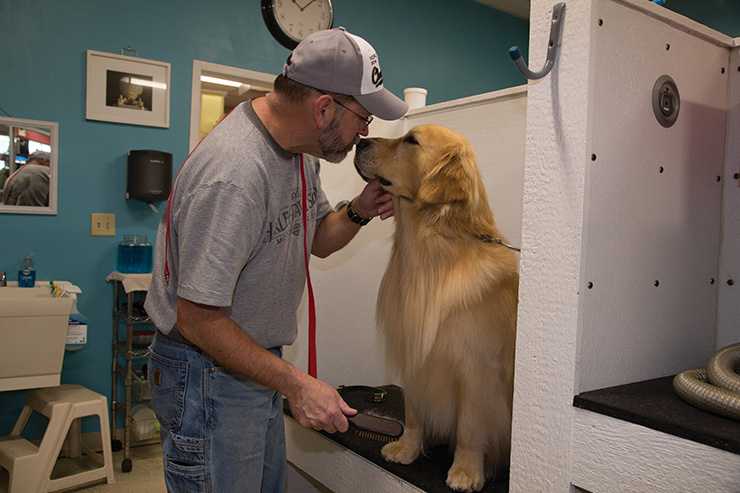
Mark Schroeder with Gage
Mark Schroeder applies the foamy, white froth to the long, shiny, golden hair as gently as if he were giving a first shampoo to a newborn.
His fingers dig in slightly, moving in tight circular motions over the back, sides and underbelly, careful not to miss a single spot. This ritual is followed by a soft, gradual, warm rinse which leads to a blow-dry and brushing out of excess, shedding hair.
The recipient appears unfazed by it all—no sudden, unwanted movements, no vocalizations, not as much as a change in facial expression. This is a routine shared at least once every two weeks during the winter months, once a week during the sweatier summers.
Gage was ready for his close-up.
Truth be told, Gage, an exquisite-looking Golden Retriever, might not have many more close-ups left in his future. At age 4, he’s already received his Grand Champion for conformation—conforming to the highest judged standards of his breed at a series of dog shows—having compiled his points for such a distinction in very quick and impressive fashion.
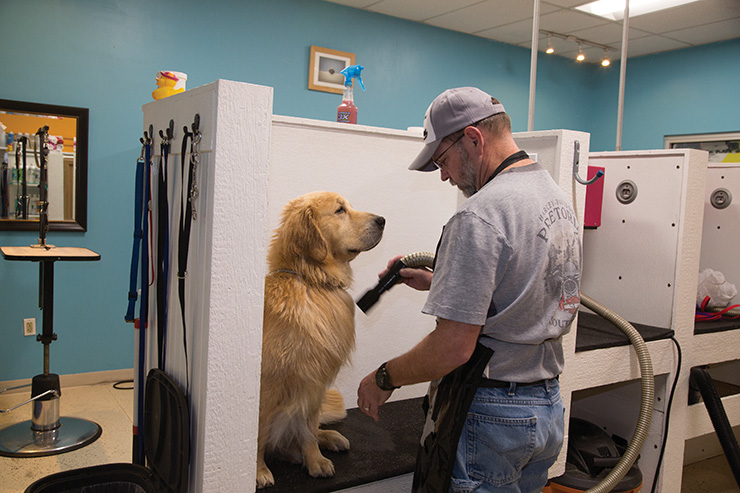
Mark Schroeder with Gage
Championships are awarded to dogs that have passed through a process of selection at dog shows. Dogs are judged based on their breeds and qualities that show they’re closest to the ideal in terms of breed standards, such as coat color, texture and luminosity. Other traits judged include bone structure, height, weight, even pigment of skin on their noses.
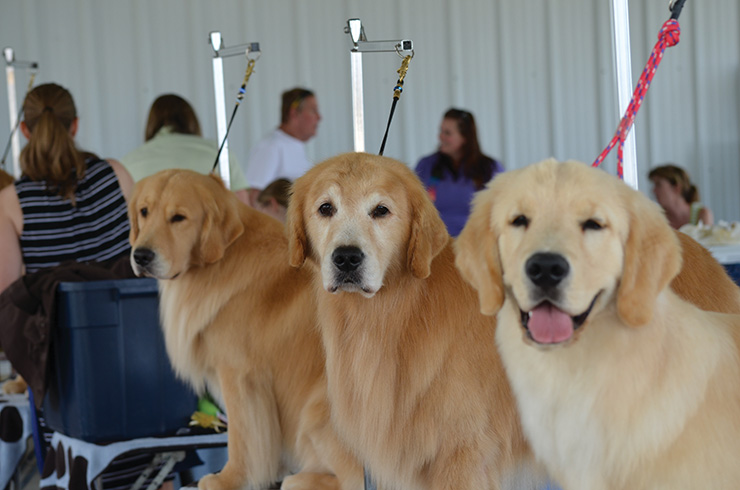
3 Generations of Champions
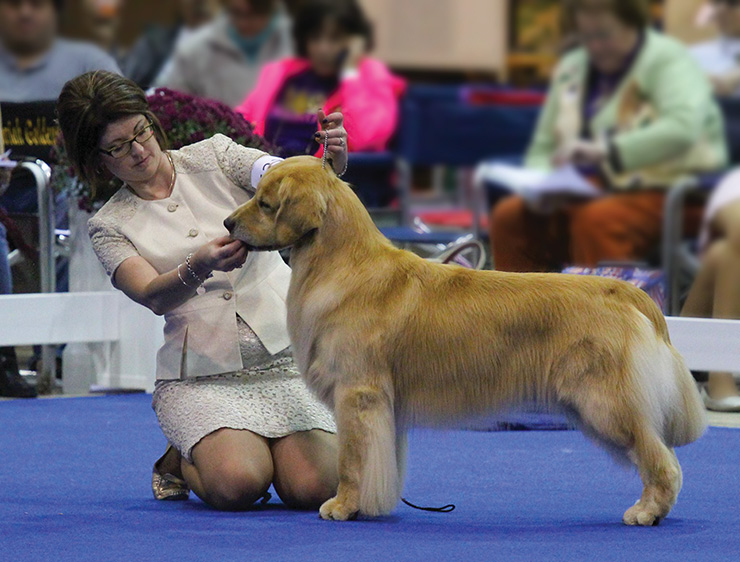
Gage (being shown by professional handler Cortney Corral) in Best of Breed at the Golden Retriever Club of America National Specialty, October 2015
The more dogs that compete in a certain breed at a show, the more points are up for grabs. Kennel clubs of different countries have different point structures and requirements. The American Kennel Club requires a competitor must acquire 15 points to be designated “champion,” and included in those 15 points must be at least two “majors, which are larger shows with more entrants.”
“(Gage) went from his Champion to Grand Champion in a month,” Schroeder says. “That’s impressive.”
Once you’ve reached Grand Champion status, to show Gage further and “campaign” him for more titles would end up being quite costly.
“Gage is our first show dog, and he’s probably done,” says Debbie Schroeder, Mark’s wife and partner in all activities involving Gage and their other Golden, 5-year-old Suki. “It’s just our choice. After Grand Champion, you can continue to show him. But, we’ve already taken him to shows in Dallas, Ashville, N.C., Arizona, Utah, Michigan.
“If we wanted to campaign him, we could. But to do that is thousands of dollars. To get a dog to Westminster (Kennel Club Dog Show, the most prestigious dog show in the U.S.) would cost around $100,000.”
It’s not as though the Schroeders intend to stop working with Gage altogether. He and Suki, who are not related, both already have titles in obedience and field competitions, and Mark says he’s currently working with Gage for more field titles. Debbie is working with Suki on a tracking title.
“We don’t have lives,” Mark says. “We have our dogs.
“Have you ever seen the movie, “Best In Show”? It’s definitely over the top … but, it’s really not too far off.”
During the week, Mark works in medical sales. Debbie is a nurse. But the weekends are all about the dogs.
“I’ve always had Goldens,” Debbie says. “Mark had some Brittanys. At first, we just got dogs out of newspapers. But then, we started studying breeds.”
Debbie says she’s drawn to Goldens largely because of the fragility of the breed. One in five Goldens dies of cancer. In fact, Debbie’s first Golden succumbed to that fate. The caregiver in her makes her want to care for those at-risk in their health.
“I was looking for the purest breed,” she says. “I got Suki first. Then, the owner told us about Gage, whom he’d shown as a puppy.”
The Schroeders have, in Mark’s words, been “weekend warriors” with their dogs ever since, taking them to shows, working with them in the field or giving them baths at Pawsh Wash, a dog-grooming and pet store in west Lawrence. They belong to the Kansas City Golden Retrievers Club, Golden Retrievers Club of America and Hunting Retrievers Club.
“It’s a commitment,” Debbie says. “You can never just drop everything and go. You always have to take into account the dogs.”
Man’s Best Friend
Lifelong commitments, fixations, perhaps even a few healthy obsessions, with dogs appears to be a popular pastime in the Lawrence area. One need only gaze upon the busy and constant traffic in and out of Pawsh Wash and the frenzied activity inside on a daily basis to know this is true. The business is open from 9 a.m. to 9 p.m. seven days a week, and it needs about all that time to accommodate all who patronize it, whether they choose to wash and groom their animals themselves, or have one of the staff do it for them.
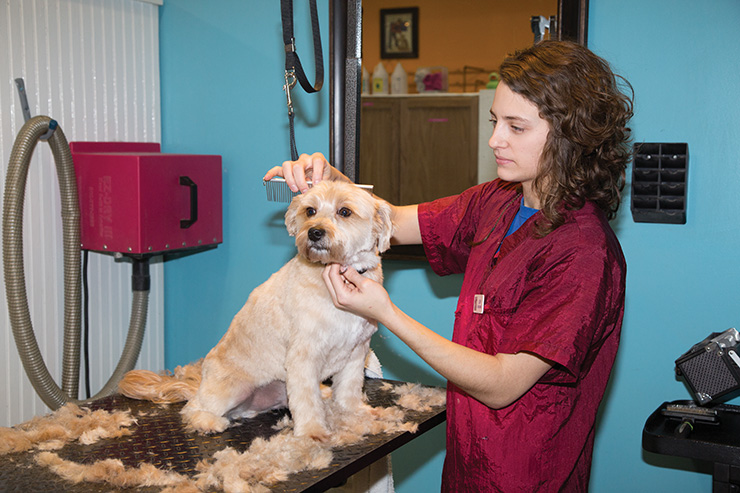
Grooming
“We run a lot of specials during the week,” says Emily Brickey, a manager at Pawsh Wash the last four years. “On Sundays, we do a 2-for-1 deal on self-service. We have a mid-week special where we do a $10 wash.
“By far, our busiest day of the week is Friday, when we do $5 nail trimming. One day, we did 90 nail trims.”
Brickey says Pawsh Wash, which is celebrating its 10th anniversary, typically schedules 30 dogs per day, and that doesn’t include walk-ins.
She says the more serious dog owners are about showing their pets, the more they seem to want to do the washing and grooming themselves.
“They tend to know more about what they’re doing,” she says. “People who show their dogs know exactly what they want done.”
Many Lawrence-based owners of show dogs also have attended obedience and conformation classes offered monthly by the Lawrence Jayhawk Kennel Club (LJKC), which has offered such classes for 45 years. At present time, the club has 49 members with around 49 different breeds.
“We have a number of owners who have won national specialties,” says Vickie Jacobs, secretary of the LJKC. “One owner received a Group 1 at the Westminster Dog Show.
“We also have club members who have therapy dogs, do agility, obedience, conformation, tracking, lure coursing, barn hunts and carting.”
Jacobs says LJCK obedience and conformation classes meet at the Douglas County Fairgrounds every Wednesday night from February through most of May. The club also meets once a month for general meetings, and during the summer it puts on picnics and hosts a lure coursing fun meet. During general meetings, the club offers a number of programs to the public.
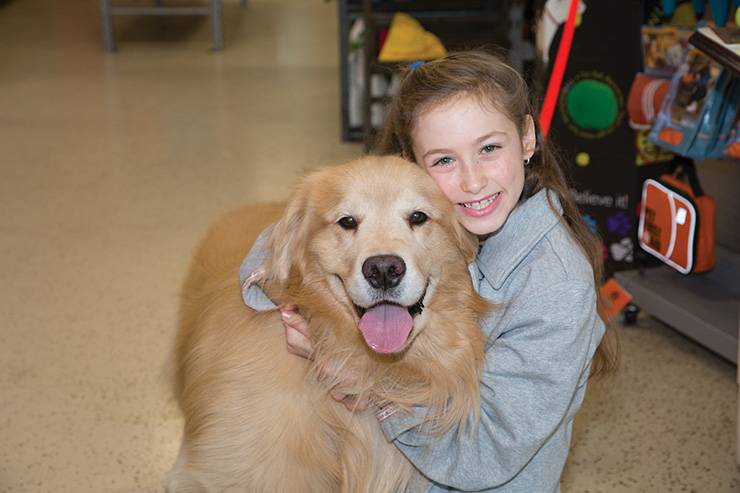
Michaela with her golden, Sam
All in the Family
People show their dogs for all sorts of reasons, but many, make it a family affair.
Toni Martin has shown her family’s 4-year-old Golden, Sam, for the last couple of years, taking him to dog shows in St. Louis and points east and north. Sam has two “minors” and one “major” to his credit. But now, it’s time for Martin’s 9-year-old daughter, Michaela, to literally take the lead. Michaela is training to become a junior showman, and Toni is hoping she’s ready for a big dog show later this year in Lawrence.
“The two are inseparable,” Martin says of Sam and Michaela. “These dogs are such tremendous companions. They transition from show life to family life so well.”
Michaela has spent hours upon hours with Sam—whose fancy show name is Kelore’s Kaptain My Kaptain, after the Kelore Kennel in Michigan where he was born—in the family’s yard working on presentation and conformation skills.
“I have to make sure the lead (leash) is always pointing toward me and on my left,” Michaela says. “We’re always doing that a lot around here, gating, standing, speed, circumference.”
Toni says, “You have to have full knowledge of breeds, especially your own breeds. It’s a lifestyle, so you use the same word commands whether it’s during show or around the house. You just make it fun.”
That’s certainly been the case for Meagan Kiser and Ben Grace, an engaged couple in their late 20s who have made grooming and training Meagan’s two Belgian Tervurens, Ariel and Belle, a big part of their lives as a couple.
Belgian Tervurens are mid-sized animals that share many of the same traits as Shepherds. They’re very elegant and stately in appearance, with short, thick black and mahogany hair, and sharp ears that point straight to the sky—at least they do if they’re show-worthy. They’re known as excellent herders of geese and sheep. In Europe, many serve as police dogs.
“I grew up with one,” Kiser says. “My parents and I fell in love with the breed. I’ve always loved dogs. I grew up in Florida and Colorado, and I fell in love with dogs when I got a Lab and Tervuren when I was about 6.”
Belle is 7, and Kiser has been showing her since she was about 1½. Ariel, Belle’s offspring, is 1 and still a little youthfully exuberant to excel at conformation showing.
Showing Tervurens, especially locally, can pose challenges. The way the conformation points system is set up, dogs have opportunities to earn more points the more dogs are entered in their breed. Problem is, Kiser and Grace have found there aren’t many people in this area that show Tervurens. In fact, Grace says the couple will enter Ariel in some competitions, even though she isn’t ready, just to boost numbers and points potential for Belle.
“I know Belle has one major,” Kiser says. “To become a champion, you have to have another major, and to win a major around here is hard because you have to have at least five dogs in competition, and there aren’t many around.
“She probably has 8 to 12 points. I want to accumulate points so that we can breed her.”
Grace says pure-bred puppies of a champion can get from $1,200 to $1,500.
The other challenge is that, as a young couple (Kiser just recently graduated from the University of St. Mary, in Leavenworth, with her physical therapy degree), they can’t afford to show Belle all around the country, so they stick mostly to area shows in Lawrence, Kansas City and St. Joseph.
“Maybe in a few years we’ll travel more when we have some money,” Grace says.
Until then, Kiser and Grace will continue working with their dogs at home, practicing sitting and staying, and getting used to people, being petted and being judged.
“We don’t do conformation stuff every day,” Grace says. “We spend more time doing agility. Agility is easier to practice at home, and Belle likes the running around. In fact, we might get back into doing more agility shows.”
While Kiser and Grace adore their dogs and love spending time with them, they’re the first to admit they’re not quite as engulfed by the whole spectacle of dog shows as most of the peers they run into regularly at local shows.
And, Kiser is quick to point out that loving the Tervurens does have its limits.
“The dogs definitely won’t be in the wedding,” she says with a laugh.

4 Comments
Attractive portion of content. I simply stumbled upon your weblog and in accession capital to claim that I acquire in fact enjoyed account your weblog posts. Any way I will be subscribing for your feeds or even I success you access consistently rapidly.|
Hi there, You have done a great job. I’ll certainly digg it and for my part suggest to my friends. I am sure they will be benefited from this web site.|
I pay a quick visit daily a few blogs and information sites to read articles or reviews, except this blog offers feature based articles.|
Hurrah, that’s what I was exploring for, what a data! existing here at this web site, thanks admin of this web page.|